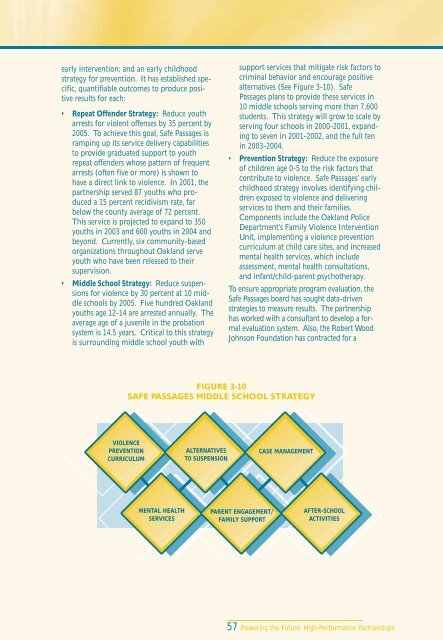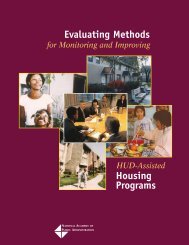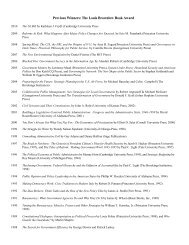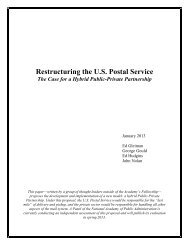High-Performance Partnerships - National Academy of Public ...
High-Performance Partnerships - National Academy of Public ...
High-Performance Partnerships - National Academy of Public ...
You also want an ePaper? Increase the reach of your titles
YUMPU automatically turns print PDFs into web optimized ePapers that Google loves.
early intervention; and an early childhood<br />
strategy for prevention. It has established specific,<br />
quantifiable outcomes to produce positive<br />
results for each:<br />
• Repeat Offender Strategy: Reduce youth<br />
arrests for violent <strong>of</strong>fenses by 35 percent by<br />
2005. To achieve this goal, Safe Passages is<br />
ramping up its service delivery capabilities<br />
to provide graduated support to youth<br />
repeat <strong>of</strong>fenders whose pattern <strong>of</strong> frequent<br />
arrests (<strong>of</strong>ten five or more) is shown to<br />
have a direct link to violence. In 2001, the<br />
partnership served 87 youths who produced<br />
a 15 percent recidivism rate, far<br />
below the county average <strong>of</strong> 72 percent.<br />
This service is projected to expand to 350<br />
youths in 2003 and 600 youths in 2004 and<br />
beyond. Currently, six community-based<br />
organizations throughout Oakland serve<br />
youth who have been released to their<br />
supervision.<br />
• Middle School Strategy: Reduce suspensions<br />
for violence by 30 percent at 10 middle<br />
schools by 2005. Five hundred Oakland<br />
youths age 12-14 are arrested annually. The<br />
average age <strong>of</strong> a juvenile in the probation<br />
system is 14.5 years. Critical to this strategy<br />
is surrounding middle school youth with<br />
support services that mitigate risk factors to<br />
criminal behavior and encourage positive<br />
alternatives (See Figure 3-10). Safe<br />
Passages plans to provide these services in<br />
10 middle schools serving more than 7,600<br />
students. This strategy will grow to scale by<br />
serving four schools in 2000-2001, expanding<br />
to seven in 2001-2002, and the full ten<br />
in 2003-2004.<br />
• Prevention Strategy: Reduce the exposure<br />
<strong>of</strong> children age 0-5 to the risk factors that<br />
contribute to violence. Safe Passages’ early<br />
childhood strategy involves identifying children<br />
exposed to violence and delivering<br />
services to them and their families.<br />
Components include the Oakland Police<br />
Department’s Family Violence Intervention<br />
Unit, implementing a violence prevention<br />
curriculum at child care sites, and increased<br />
mental health services, which include<br />
assessment, mental health consultations,<br />
and infant/child-parent psychotherapy.<br />
To ensure appropriate program evaluation, the<br />
Safe Passages board has sought data-driven<br />
strategies to measure results. The partnership<br />
has worked with a consultant to develop a formal<br />
evaluation system. Also, the Robert Wood<br />
Johnson Foundation has contracted for a<br />
FIGURE 3-10<br />
SAFE PASSAGES MIDDLE SCHOOL STRATEGY<br />
VIOLENCE<br />
PREVENTION<br />
CURRICULUM<br />
ALTERNATIVES<br />
TO SUSPENSION<br />
CASE MANAGEMENT<br />
MENTAL HEALTH<br />
SERVICES<br />
PARENT ENGAGEMENT/<br />
FAMILY SUPPORT<br />
AFTER-SCHOOL<br />
ACTIVITIES<br />
57 Powering the Future: <strong>High</strong>-<strong>Performance</strong> <strong>Partnerships</strong>









